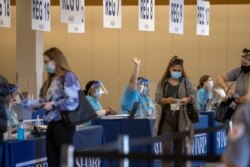Israel says it plans to shut down its international airport by the end of the week to keep out highly contagious coronavirus variants.
Prime Minister Benjamin Netanyahu said Sunday, “We are closing the skies hermetically, except for really rare exceptions, to prevent the entry of virus mutations, and also to ensure that we progress quickly with our vaccination campaign.”
The new measure is set to begin Tuesday and last until the end of the month, pending parliamentary approval.
Meanwhile, the White House said Sunday it is ready to restrict entry of non-U.S. citizens traveling to the U.S. from South Africa because of concerns about the highly contagious coronavirus variant that has emerged there.
The U.S. is increasing efforts to track several coronavirus variants emerging as the virus continues to spread throughout the world, a health official said Sunday.
The plan is to monitor "the impact of these variants on vaccines, as well as on our therapeutics," as the virus continues to mutate while it spreads, said Dr. Rochelle Walensky, head of the U.S. Centers for Disease Control and Prevention.
"We are now scaling up both our surveillance of these and our study of these," Walensky said during a Fox News Sunday interview. She said the CDC was collaborating with the National Institutes of Health, the Food and Drug Administration, as well as the Pentagon, in tracking the coronavirus mutations.
The news comes as the world is on the verge of reaching 100 million COVID-19 infections, according to the Johns Hopkins Coronavirus Resource Center. More than 2 million people have died from the virus.
"We're in a race against these variants," said Vivek Murthy, who has been nominated by President Joe Biden to become the next U.S. surgeon general, on ABC's "This Week" program Sunday.
Walensky took the helm at the CDC last Wednesday, as Biden was inaugurated.
The recent emergence of several coronavirus variants, which have shown to be more transmissible — and in the case of a strain first identified in Britain, possibly more lethal — has made vaccinations a top issue for health officials.
Walensky said that until enough people have been vaccinated, providing "herd" immunity, mask-wearing and social distancing will need to remain in place to "decrease the amount of virus that is circulating, and therefore, decrease the amount of variants that are out there," the CDC chief said.
Scientists said last week that while the British variant was associated with a higher level of mortality, it was believed that existing vaccines were still effective against it. However, a more contagious South African variant may reduce the efficacy of current vaccines, scientists said.
Mexican President Andres Manuel Lopez Obrador has become the most recent world leader to announce that he had tested positive for COVID-19, the disease caused by the coronavirus.
"I regret to inform you that I am infected with COVID-19. The symptoms are mild, but I am already undergoing medical treatment," the 67-year-old wrote on Twitter Sunday.
Mexico has confirmed more than 1.7 million cases of COVID-19 and recorded more than 149,000 deaths — the fourth-highest death toll in the world after the United States, Brazil and India, according to Johns Hopkins.
India follows the U.S. caseload with 10.6 million infections and more than 153,000 deaths. Brazil has nearly 9 million cases and more than 217,000 deaths.
On Monday, Australia approved use of the Pfizer/BioNTech vaccine against the coronavirus, Prime Minister Scott Morrison said. The country expects to begin vaccinating priority groups in late February.
New Zealand health officials confirmed Monday that they are investigating its first domestic case of COVID-19 since mid-November.
The positive case is a 56-year-old woman who has become infected with the South African variant. She returned to New Zealand December 30 and probably became infected by a fellow returnee in a quarantine facility, an official said.
COVID-19 response minister Chris Hipkins said officials are looking at whether the coronavirus could have spread through the quarantine facilities’ ventilation and air conditioning systems.
Authorities said the woman’s husband has tested negative.
With a tough lockdown, New Zealand had nearly eliminated the coronavirus, with new cases found among travelers returning home and quarantining. As of Sunday, there were 79 such cases. The new variants from Britain and South Africa, however, have been found among those cases, raising concerns of community spread returning.
New Zealand does not expect to have most of its population vaccinated against the coronavirus until the second half of the year.








